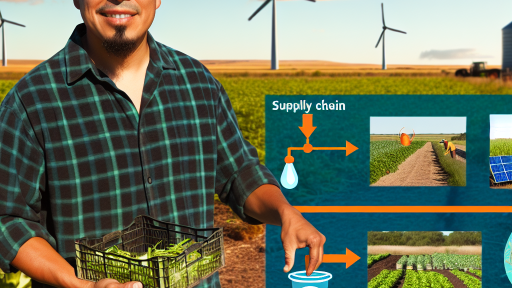Overview of Tax Planning in Agriculture
Importance of Tax Planning
Tax planning plays a crucial role for farmers and agribusinesses.
It aids in optimizing tax liabilities and enhancing cash flow.
Additionally, effective tax planning helps make informed financial decisions.
Moreover, it can mitigate tax-related risks and uncertainties.
Benefits of Tax Planning
Farmers can benefit from tax planning in various ways.
First, it allows for the identification of eligible tax deductions.
Second, it enables effective utilization of tax credits.
Third, strategic planning can lead to deferral of income taxes.
Furthermore, small farmers can leverage specific tax incentives.
- Qualified business income deductions
- Depreciation deductions for equipment
- Conservation program benefits
In addition, tax planning can support long-term business growth.
Consequently, it fosters stability and sustainability in farming operations.
Overall Impact on Agribusinesses
For agribusinesses, tax planning has a substantial impact.
It enhances competitive advantage in the marketplace.
Moreover, it promotes informed investment decisions.
Effective tax strategies can also strengthen relationships with financial institutions.
Transform Your Agribusiness
Unlock your farm's potential with expert advice tailored to your needs. Get actionable steps that drive real results.
Get StartedUltimately, comprehensive tax planning facilitates organizational growth.
Understanding Different Tax Regulations Affecting Farmers and Agribusinesses
Overview of Tax Regulations
Tax regulations create a framework for farmers and agribusinesses.
They help determine tax obligations and filing requirements.
Understanding these regulations is crucial for financial planning.
Types of Taxes Applicable to Farmers
Farmers face various types of taxes.
Income tax applies to profits made from farming operations.
Sales tax may be imposed on certain agricultural products.
Property tax affects farmland and associated structures.
Additionally, self-employment tax impacts farmers operating as sole proprietors.
Federal vs. State Regulations
Federal regulations set baseline tax policies for all states.
However, state regulations may vary significantly.
Each state could offer different tax credits and incentives.
Farmers need to stay updated on both federal and state requirements.
Deductions and Credits for Agricultural Businesses
Tax deductions reduce taxable income for farmers.
Common deductions include equipment and operational costs.
Farmers can also benefit from specific tax credits.
For instance, credits for energy-efficient practices are available.
Understanding available deductions and credits is vital for savings.
Record-Keeping and Documentation
Accurate record-keeping simplifies tax preparation.
Farmers must maintain detailed records of all income and expenses.
Documenting transactions supports claims for deductions and credits.
Utilizing accounting software can aid in record management.
Consulting Tax Professionals
Tax professionals can provide valuable guidance for farmers.
They help navigate complex regulations and maximize benefits.
Showcase Your Farming Business
Publish your professional farming services profile on our blog for a one-time fee of $200 and reach a dedicated audience of farmers and agribusiness owners.
Publish Your ProfileRegular consultations can ensure compliance with changing laws.
Building a relationship with a tax expert is a prudent strategy.
Impact of Tax Policy Changes
Tax policies may change based on economic shifts.
Farmers must stay informed about potential impacts on their operations.
Changes could affect everything from deductions to tax rates.
Proactive measures can help mitigate negative impacts of policy changes.
Strategies for Record Keeping and Documentation to Maximize Deductions
Importance of Accurate Record Keeping
Accurate record keeping is vital for farmers and agribusinesses.
It helps track income and expenses effectively.
Moreover, it supports maximizing tax deductions.
Good records can simplify the preparation of tax returns.
It can also protect against audits by the IRS.
Implementing a Reliable Record Keeping System
Establishing a reliable record keeping system is essential.
Start by selecting a method that suits your needs.
You can use digital software or maintain physical records.
Utilize accounting software designed for agriculture.
For example, QuickBooks or FarmBooks can be very helpful.
Tracking Income
Document all sources of income meticulously.
Keep records of sales receipts and invoices.
Consider categorizing income by source for clarity.
This will help in analyzing performance over time.
Recording Expenses
Accurately record all business-related expenses.
This includes equipment, supplies, and labor costs.
Regularly update your expense records to avoid discrepancies.
Maintain receipts and invoices for verification.
Utilizing Technology for Documentation
Technology can enhance your record keeping practices.
Use mobile applications to capture receipts on the go.
Cloud storage solutions can keep your records secure and accessible.
This allows for easy retrieval when needed for tax purposes.
Maintaining Proper Documentation for Deductions
Proper documentation is critical for claiming deductions.
Ensure you keep copies of all tax-related documents.
This includes forms, schedules, and supporting documentation.
Review IRS guidelines to understand necessary records.
Regularly Reviewing Financial Records
Regularly review your financial records for accuracy.
This helps identify any missing information or errors.
Conduct monthly or quarterly reviews based on your business needs.
Consider hiring an accountant for professional guidance.
Staying Informed About Tax Changes
Stay updated on tax law changes that affect your business.
Engage with agribusiness associations for relevant information.
Attend workshops or seminars to further your understanding.
This can help you adapt your record keeping strategies accordingly.
Showcase Your Farming Business
Publish your professional farming services profile on our blog for a one-time fee of $200 and reach a dedicated audience of farmers and agribusiness owners.
Publish Your ProfileYou Might Also Like: Choosing the Best Insurance for Your Farm
Exploring Tax Credits and Grants Available for Agricultural Businesses
Introduction to Tax Credits
Tax credits play a crucial role in reducing tax liabilities for farmers.
They incentivize the adoption of sustainable practices and technologies.
Moreover, various programs target specific agricultural activities.
Types of Agricultural Tax Credits
Numerous tax credits exist for agricultural businesses to leverage.
Some credits focus on conservation and environmental efforts.
- The Conservation Reserve Program offers payments for land conservation.
- The Renewable Energy Investment Tax Credit supports renewable energy installations.
Other credits may apply to equipment purchases and improvements.
Understanding Grants for Farmers
Grants provide essential funding opportunities for agribusinesses.
These funds do not require repayment, making them particularly beneficial.
Several federal and state programs offer grants tailored for agriculture.
Categories of Available Grants
Farmers can explore different categories of grants.
- Research and development grants help innovate agricultural practices.
- Infrastructure grants support the development of essential facilities.
- Business development grants assist in expanding farm operations.
Application Processes for Tax Credits and Grants
Applying for tax credits requires thorough documentation and compliance.
Farmers should maintain accurate records of expenses and activities.
Grant applications also necessitate detailed project proposals.
It is vital to be aware of deadlines and requirements for submissions.
Resources for Farmers Seeking Credits and Grants
Several resources can assist farmers in finding available programs.
The USDA provides information on various financial assistance options.
Additionally, state departments of agriculture often list local opportunities.
- Consulting with local agricultural extensions can yield valuable insights.
- Networking within farming communities can uncover lesser-known opportunities.
Maximizing Benefits from Tax Credits and Grants
Farmers should develop a comprehensive strategy for utilizing credits and grants.
By planning ahead, they can optimize their financial outcomes.
Staying informed about changing regulations is crucial for compliance.
Discover More: Cost Control Methods For Sustainable Farm Financial Health
Impact of Legal Structure on Tax Planning
Sole Proprietorship
A sole proprietorship is the simplest business structure.
This option is easy to set up and maintain.
As the sole owner, you directly control your profits.
However, this structure exposes you to personal liability.
Your business income is reported on your personal tax return.
This means you might face higher self-employment taxes.
Additionally, you cannot take advantage of certain tax deductions.
Limited Liability Company (LLC)
An LLC offers more protection than a sole proprietorship.
This structure shields personal assets from business liabilities.
Tax treatment can be flexible for LLCs.
They can choose to be taxed as a sole proprietorship or a corporation.
This flexibility helps in optimizing tax outcomes.
LLC owners can also deduct business expenses more readily.
This includes benefits like health insurance premiums.
Corporations
Corporations are separate legal entities from their owners.
They offer robust liability protection for shareholders.
However, corporations can be more complex and costly to maintain.
They face double taxation on profits: once at the corporate level and again on dividends.
Showcase Your Farming Business
Publish your professional farming services profile on our blog for a one-time fee of $200 and reach a dedicated audience of farmers and agribusiness owners.
Publish Your ProfileC corporations can provide significant tax benefits through retained earnings.
S corporations allow income to pass through to shareholders.
This avoids the double taxation issue.
Choosing the Right Structure
Selecting a legal structure is crucial for tax planning.
Evaluate your business size, risk levels, and long-term goals.
Consult with a tax advisor to personalize your strategy.
The right structure can lead to significant tax savings.
Furthermore, it can offer enhanced growth opportunities.
Discover More: Risk Management Strategies for Successful Farming

Utilizing Depreciation and Amortization for Equipment and Land Assets
Understanding Depreciation
Depreciation allows farmers to recover the cost of their assets over time.
This process can apply to various equipment types used in agribusiness.
It plays a critical role in lowering taxable income.
Farmers can choose among different depreciation methods.
The most common methods include straight-line and declining balance.
Applying Straight-Line Depreciation
Straight-line depreciation spreads the cost evenly across the asset’s useful life.
For example, a tractor purchased for $50,000 may last for ten years.
In this case, the annual depreciation expense would be $5,000.
This method is simple and easy to calculate.
Additionally, it helps in financial planning and budgeting.
Implementing Declining Balance Depreciation
Declining balance depreciation allows for larger deductions in early years.
This method is beneficial for assets that lose value quickly.
It generally provides tax relief sooner rather than later.
Farmers can apply various rates depending on the asset type.
For instance, a rate of 200% might be used for certain machinery.
Understanding Amortization
Amortization functions similarly to depreciation but applies to intangible assets.
Farmers may use it for costs like patents or leases.
This process helps in allocating the cost over a specified period.
Amortization also reduces taxable income.
It’s essential for managing cash flow effectively.
Identifying Eligible Assets
Farmers should assess which assets qualify for depreciation or amortization.
Common depreciable assets include vehicles, buildings, and farm equipment.
On the other hand, intangibles might include software or customer lists.
Understanding asset eligibility helps optimize tax benefits.
Record Keeping Practices
Accurate record keeping is vital for effective tax planning.
Farmers should maintain detailed records of asset purchases.
This includes invoices, receipts, and any documentation related to usage.
Additionally, keeping track of maintenance and improvements is essential.
These details support claims for depreciation and amortization deductions.
Consulting With Professionals
Working with tax professionals ensures compliance with tax laws.
Tax experts can provide guidance on the most efficient strategies.
Showcase Your Farming Business
Publish your professional farming services profile on our blog for a one-time fee of $200 and reach a dedicated audience of farmers and agribusiness owners.
Publish Your ProfileThey can help farmers navigate changing regulations easily.
Furthermore, they can tailor plans specific to the farm’s needs.
This partnership is crucial for maximizing tax advantages.
Explore Further: Best Practices in Farm Succession Strategies
Planning for Succession: Tax Implications and Strategies for Transitioning Operations
Understanding Succession Planning
Succession planning is vital for farmers and agribusinesses.
It ensures the smooth transition of management to the next generation.
Moreover, it addresses both operational and tax-related issues.
Tax Implications of Succession
Tax implications can significantly affect succession plans.
For instance, transferring ownership can trigger capital gains taxes.
Additionally, estate tax liabilities may arise during the transition.
Understanding these taxes allows for better planning and reduced liabilities.
Strategies for Effective Transitioning
Planning ahead is crucial for a successful transition.
First, establish a timeline for the succession process.
This timeline should include key milestones and objectives.
Next, involve family members early in the discussion.
Valuation of the Business
A proper business valuation can aid in effective transition planning.
It provides a clear understanding of the business worth.
This knowledge can help set realistic expectations for all parties.
Gifting vs. Selling Assets
Consider the benefits of gifting versus selling assets to heirs.
Gifting can minimize tax implications under specific circumstances.
However, selling may provide immediate financial benefits.
Each option has unique tax consequences to evaluate.
Utilizing Trusts and Legal Structures
Establishing a trust can be an effective succession strategy.
A trust can help manage tax implications during the transition.
Moreover, it can protect assets from long-term liabilities.
Consulting Professionals
Engaging with financial advisors and legal experts is essential.
They can provide tailored advice based on individual circumstances.
Professional guidance ensures compliance with tax laws.
Furthermore, it enhances the effectiveness of the succession plan.
Continuous Review and Adaptation
Lastly, regularly review the succession plan.
Farming operations and tax laws can change over time.
Adjustments may be necessary to stay aligned with current realities.
Ongoing evaluation helps preserve the legacy of the agribusiness.
Tax Considerations for Sustainable and Organic Farming Practices
Regulatory Framework
Sustainable and organic farming practices must comply with various regulations.
Understanding these regulations helps farmers navigate tax implications effectively.
Specific guidelines apply to organic certifications.
Farmers should familiarize themselves with USDA regulations.
State and local laws also influence farming practices.
Tax Benefits of Sustainable Practices
Farmers can access tax credits and deductions for sustainable initiatives.
Investing in conservation practices often yields tax benefits.
Showcase Your Farming Business
Publish your professional farming services profile on our blog for a one-time fee of $200 and reach a dedicated audience of farmers and agribusiness owners.
Publish Your ProfileAdditionally, renewable energy systems are eligible for significant incentives.
Some states offer credits for using organic farming methods.
These credits can substantially reduce tax liabilities.
Record Keeping for Organic Farming
Maintaining detailed records is crucial for tax compliance.
Farmers should document every expense related to organic farming efforts.
Receipts for organic seeds and inputs must be preserved.
Tracking labor costs also plays a key role in accurate tax reporting.
Successful record-keeping eases the process during audits.
Utilizing Tax Deductions
Farmers can deduct various expenses related to organic certification.
Qualifying expenses include inspections and certification fees.
Deducting these costs can lower overall taxable income.
Additionally, equipment purchases contribute to deductions.
Farmers should review all eligible deductions annually.
Subsidies and Grants
Farmers should explore available subsidies and grants for organic farming.
These financial aids can offset operational costs significantly.
Applying for federal and state programs can enhance financial stability.
Farmers must remain informed about changing grant opportunities.
Successful applications often lead to additional resources.
Long-Term Planning
Tax planning involves considering long-term sustainability goals.
Farmers should align their tax strategies with future business objectives.
This approach ensures consistent growth and fiscal responsibility.
Regularly reviewing tax strategies can identify new opportunities.
Consulting with a tax advisor specialized in agriculture enhances decision-making.




